“Resistance”
Written by Michael Jan Friedman & Kevin J. Ryan and Lisa Klink
Directed by Winrich Kolbe
Season 2, Episode 12
Production episode 128
Original air date: November 27, 1995
Stardate: unknown
Captain’s log. Janeway, Tuvok, Torres, and Neelix are undercover on a planet. Neelix brings a vial to Janeway in a covert manner, looking for all the world like they’re consummating a drug deal. Once Janeway confirms that it’s the terellium they’re looking for, she sends Neelix to finish the transaction.
While he’s gone, some Mokra soldiers ambush them. There’s a big donnybrook, ending with Tuvok and Torres captured, though not until after they’ve done significant harm to the soldiers. Janeway, however, is rendered unconscious and taken away by someone.
Neelix exits the shop to find the away team gone. However, Voyager’s need for terellium is sufficiently great that Chakotay beams him straight to engineering so Kim can apply the terellium to the plasma injectors. This does the trick and Kim is able to restore main power.
Now they need to locate the away team. Neelix is concerned that a member of the Alsaurian resistance gave them away—but not Neelix’s contact that got them the terellium, as if it had been him, he never would have acquired the substance in the first place.
Buy the Book
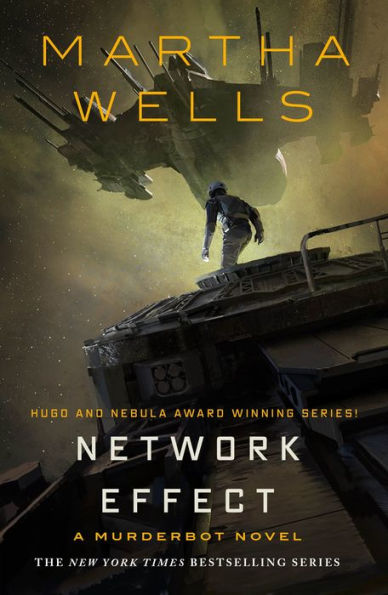

Network Effect
The moment they come out from behind the moon, Voyager is hailed by Third Magistrate Augris of the Mokra, who pretends to be friendly and kind, and says he’ll check and see if their away team has been detained.
In truth, he already knows, as he immediately goes to Tuvok and Torres and interrogates them about the rebels they’re collaborating with. The two officers’ insistence that they don’t know anything about the resistance falls on deaf ears, and Augris takes Tuvok away to be tortured.
Janeway awakens in the care of an old man named Caylem, who thinks Janeway is his daughter Ralkana. Janeway is grateful to him for treating her wounds, but she needs to find the rest of her team. Caylem assumes that Ralkana is telling him a funny story about her being a starship captain. Every attempt Janeway makes to get a straight answer out of Caylem fails, as he clings to the delusion that Janeway is his daughter. When the subject of the prison comes up, Caylem says that his wife, Ralkana’s mother, is imprisoned there.
Augris boards Voyager and, like Tanis before him, speaks of the bad rep that Voyager has gotten since their arrival in this quadrant. He goes so far as to say that he’s not sure he even believes that they really come from another quadrant. (The fact that they’ve been on a straight-line course for the better part of a year should be a clue, but whatever.)
He tells Chakotay that he will consider letting him talk to the away team, but Chakotay doesn’t believe him for a second.
Caylem shows Janeway the letters he’s written to his wife in prison. Caylem wants to help her get the others out of prison, but Janeway doesn’t want to endanger him. The question is tabled when Mokra soldiers show up to search the house. They escape via a secret route.
Augris is seeking Janeway out, and he almost arrests Darod, Neelix’s contact. However, Caylem play-acts like a complete fool, which defuses the situation. Augris leaves, and Janeway pleads with Darod for help. He offers weapons so she can break the others out of prison in exchange for Ralkana’s jewel-covered necklace, which Janeway is reluctant to offer, but Caylem insists. However, the contact is three hours late for the exchange, and when he does show up, Janeway notices that he’s wearing military boots.
Darod has obviously been compromised and the weapons exchange was a trap. So she tries Plan B: pretending to be a prostitute trying to get in via a horny guard. This actually works, but then she locks Caylem in a cell so he won’t get hurt, promising to find his wife.
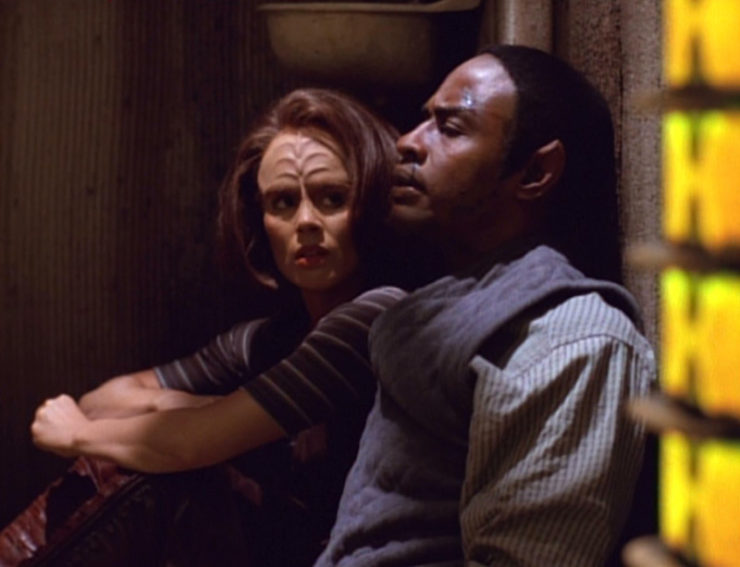
Tuvok returns to the cell battered and bloody. Torres is disgusted, but Tuvok insists that what matters is that he did not give in.
Kim tries a trick to make the Mokra think there are multiple transporter signals beaming down when they beam a rescue team into the prison. This fails, and the Mokra fire on them. But then Janeway is able to kill all power in the prison, which eliminates all the force fields. Chakotay takes advantage and beams Paris and a rescue team into the prison.
Tuvok and Torres are able to leave their cell, as are Caylem and Darod, and everyone is reunited. However, Augris ambushes them, and reveals that both Caylem’s wife and daughter were killed years ago. Every once in a while, Caylem tries to break into the prison to get them out, and every time Augris lets him go quietly back home, as he’s harmless and makes a good example to others who would defy them.
There’s a firefight, and the Voyager crew are victorious, with Augris fatally stabbed, but with Caylem also shot. As he dies, Janeway finally gives in to his delusion, pretending to be Ralkana and saying that she and her mother both forgive him. Darod promises that the tale of Caylem’s bravery will be told.
Chakotay beams them back and they high-tail it out of orbit, the ship now fully operational. Janeway still has Ralkana’s necklace, and clutches it sadly.
Can’t we just reverse the polarity? Apparently, if you run out of terellium, the warp core stops working and main power fails. It looks like a lubricant of some sort, and I guess it can’t be replicated?
There’s coffee in that nebula! Janeway is patient but insistent with Caylem, not giving in to his delusion, but not completely denying it, either. She’s focused primarily on getting her people safely offworld. She also does everything she can to protect Caylem, though she is unable to save him in the end.
Mr. Vulcan. Tuvok is tortured so badly, he screams in agony. Torres is shocked to realize that a Vulcan can feel pain like that.
Half and half. Torres tries to break out of the prison by mucking with the control circuit, and fails.
Everybody comes to Neelix’s. Neelix is the one who sets the deal up, and who gets the terellium, which pretty much saves everyone’s ass, as the ship is falling apart without it. Just in general, this episode is one of the best uses of Neelix, as he’s actually serving the function he boarded the ship to serve, to wit, local guide.
Forever an ensign. With Torres in a cell on the planet, it’s left to Kim to do all the technobabble, including talking Chakotay into dropping shields to preserve power, and also coming up with ways to try to rescue the away team, with varying degrees of success.
Do it.
“May I assume you’re seeking permission to conduct business with us?”
“No, some of my crewmembers have already been to the surface. We’ve lost contact with them.”
“I see. You must have been unaware of our regulations. I’ll transfer a complete copy for future reference.”
–Augris being a dick, Chakotay responding, and Augris being a bigger dick.
Welcome aboard. Trek veterans Alan Scarfe and Glenn Morshower play, respectively, Augris and the prison guard. Scarfe previously played two different Romulans on TNG, Mendak in “Data’s Day” and Tokath in “Birthright, Part II.” Morshower previously was Burke in TNG’s “Peak Performance,” Orton in TNG’s “Starship Mine,” and an Enterprise-B bridge officer in Generations, and he’ll be back as Sheriff MacReady in Enterprise’s “North Star.”
Tom Todoroff plays Darod, and one of the extras is played by Chuck Butte, who won a contest to appear on Voyager.
But the big guest is the great Joel Grey as Caylem. The producers had been trying to get Grey on the show since the beginning, and this was the role that finally landed him.
Trivial matters: The story for this episode is by Michael Jan Friedman and Kevin J. Ryan, who both have a long history with Star Trek fiction (and, full disclosure, both are friends and colleagues of your humble rewatcher). Friedman has written extensively for Trek in prose and comics, including more than thirty novels, a bunch of short stories, original-series comic books, and reference works, plus he was the writer of DC’s monthly TNG comic book for its entire 80-issue run from 1989-1996. Ryan was an editor in charge of Trek fiction from 1988-1996, a period during which Trek novels regularly hit the Times best-seller list. Ryan also wrote two original-series trilogies, Errand of Fury and Errand of Vengeance, six novels that set up the Klingon war that broke out in the episode “Errand of Mercy.” Ryan and Friedman also collaborated on the TNG novel Requiem. The pair pitched several stories to both TNG and Voyager, though this one, which they more or less pitched as Voyager meets Don Quixote, is the only one that sold.
The script was assigned to Lisa Klink, who had newly joined the writing staff and was thrown into the deep end of the pool by being told to write this episode. She did well enough to stay on board, working her way up to executive story editor for the show’s fourth season before moving on to other projects. Klink also would write the Borg invasion short film used at Star Trek: The Experience in Las Vegas.
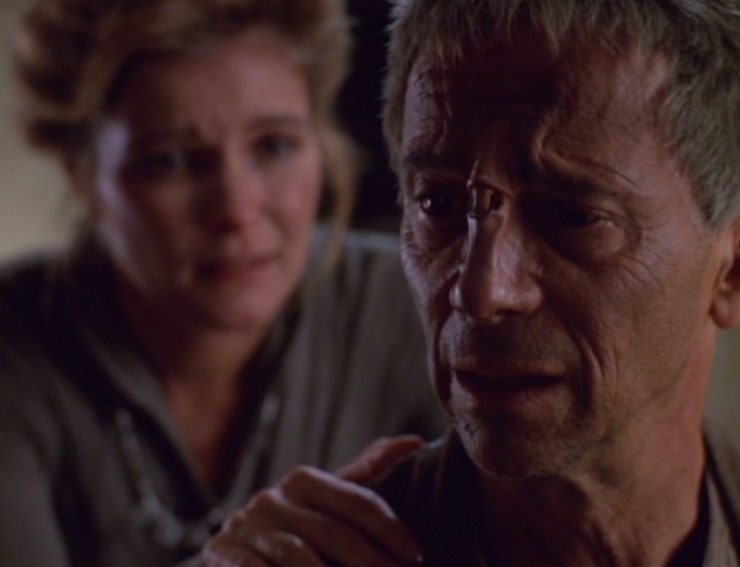
Set a course for home. “She forgives you—we both do.” This is a really good, solid episode. On the surface, it’s somewhat cliché, but clichés become such for good reason, for the most part, and in this case the story beats work due to three factors.
First there’s Winrich Kolbe’s superbly atmospheric direction. There’s a sense of heavy oppression in every scene on the planet, which combines with Kolbe’s trademark excellent use of closeups to hammer home the misery of life under the Mokra. Kolbe has consistently been one of the best TV directors in the business, and I’ve always felt that he was one of the two or three best directors Trek has ever had (with only Jonathan Frakes and Hanelle Culpepper giving him any competition)
Then there’s the solid script by Lisa Klink. It would have been very easy to play Caylem’s delusions for cruel laughs, with Janeway growing angry and frustrated by his delusions, but Klink’s script keeps Janeway’s reactions reasonable and understandable and kind, without her ever losing track of her most important mission, to wit, finding and rescuing the rest of her team. I also like the way Klink handles the Tuvok-Torres scenes, as Torres makes the oh-so-common mistake that Vulcans are emotionless, when in fact they have very turbulent emotions that they suppress through logic and discipline—which are hard to maintain when someone’s torturing you.
I also admire Klink simply letting the crew do their jobs without any of the baggage. Neelix is The Local Guide, and he does that job very well in that episode, and we don’t get any of the character’s goofy excesses. Kim is The Science Guy, throwing technobabble ideas at Chakotay fast and furious, while Chakotay is The First Officer, holding things together while Janeway’s out of commission, the same way Spock, Riker, and Kira have done for their captains in the past.
And finally there’s the best part of the episode, the acting. The casting helps Klink’s script out a lot. For starters, we need to be introduced to the Mokra in fairly short order, and the teaser does that nicely with the tense, clandestine meeting to see if the merchandise is any good, followed by showing how incredibly nasty the Mokra are by the simple expediency of casting Alan Scarfe at his absolute slimiest as Augris.
Scarfe has one of the most amazing voices in the world, and he puts it to excellent use, as his oily line deliveries make it very easy to root against Augris, even before he starts torturing Tuvok.
Kate Mulgrew puts in one of her finest performances, giving us a captain who does everything she can to help out her crew, while still showing compassion for the crazy guy who rescued her. (I’m less sanguine about her pretending to be a prostitute to break into the prison—I started getting Star Trek V flashbacks—but it says a lot more about the Mokra that they fell for it in this case…) I love that she never gives in to the delusion—not even to make her own situation easier, as she could have easily at several points—until the very end, when it’s a kindness to a dying person.
And then we have Joel Grey, who absolutely makes the episode. Without his nuanced, delightful, frightening, tragic performance, the episode would fall apart. He is brilliant as Caylem, and you find yourself tearing up alongside Janeway at the end after he dies. I especially love that he’s together enough to mount the occasional prison break attempt, and also enough to play the fool to defuse the situation with Dorad, going so far as to wear a melon as a hat. It highlights the tragedy—there’s enough of his frayed persona left to be that self-aware, but not enough to admit that Janeway isn’t his daughter or that his wife and daughter are both dead.
Warp factor rating: 9
Keith R.A. DeCandido encourages all and sundry to support the crowdfund for the third book in the “18th Race” trilogy of military science fiction novels, To Hell and Regroup, which Keith wrote with David Sherman. It’s being jointly funded along with Christopher L. Bennett’s duology, Arachne’s Crime and Arachne’s Exile. It’s already reached the funding goal, so if you support it, you’re guaranteed to get the books! Check it out!










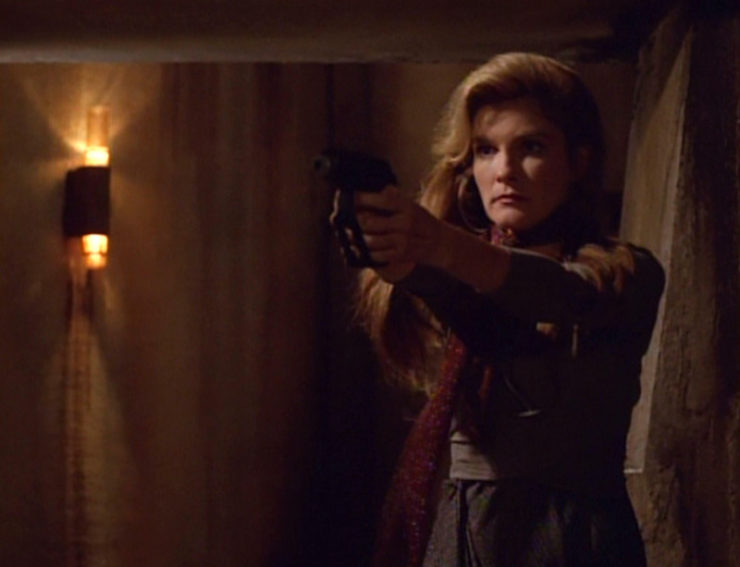
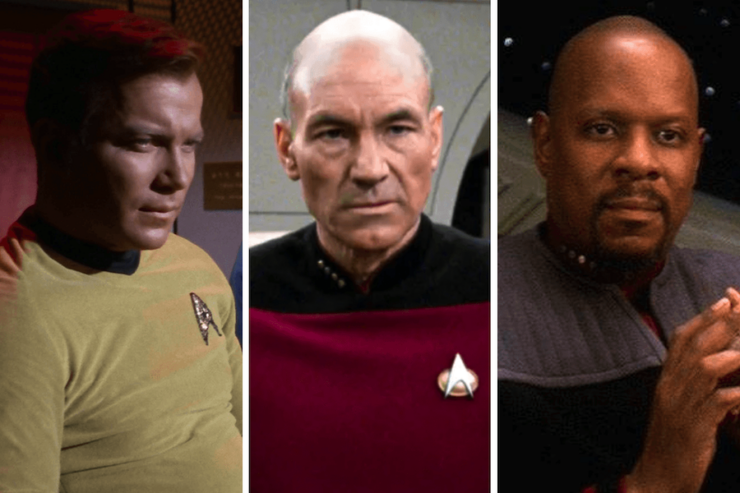
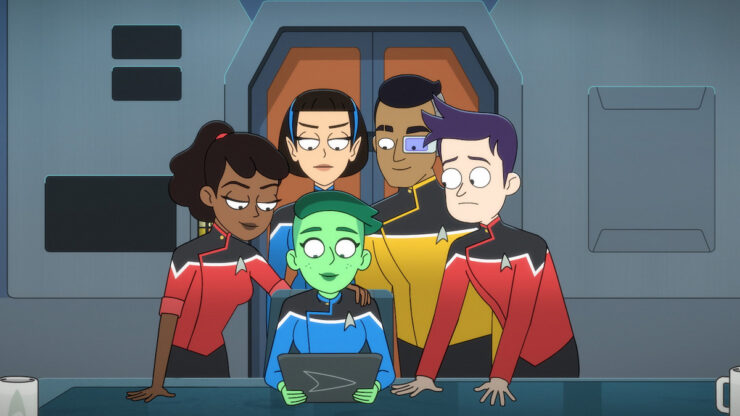
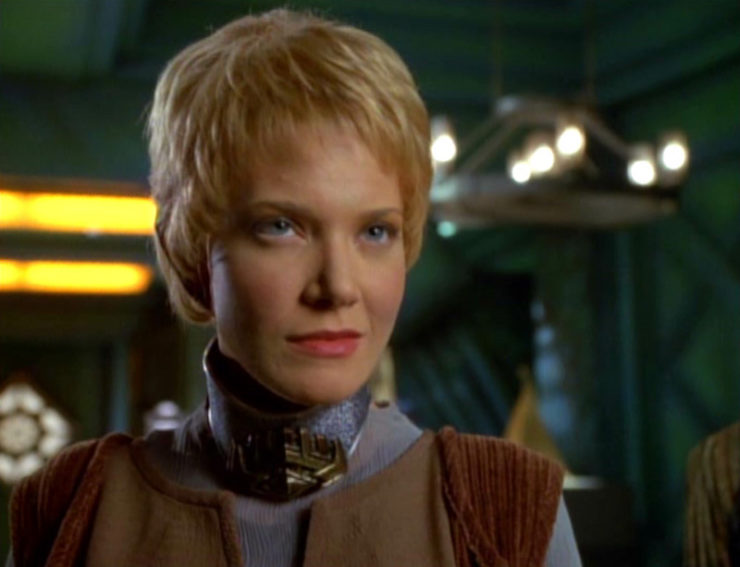
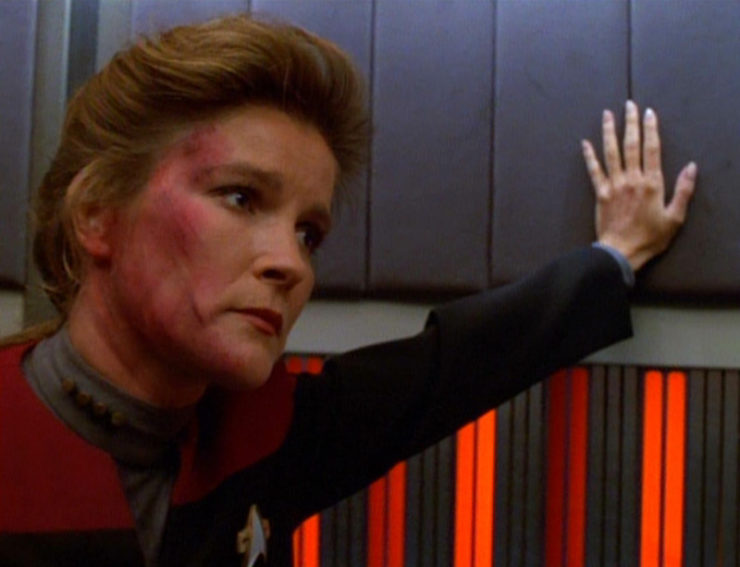
Pretty good episode, though I was rather put off by the nose prosthetic on Joel Grey. The different variations of nose/forehead aliens continues to amuse me, though.
Thank goodness those aliens spoke English or Janeway would have been out of luck after losing her comm badge.
Certainly one of Voyager‘s best, and a strong start for Lisa Klink, one of the show’s best writers.
“(The fact that they’ve been on a straight-line course for the better part of a year should be a clue, but whatever.)”
Not really, because in a year they can’t have traveled more than about 1000 light-years tops, and a whole quadrant of the galaxy has a radius of at least 50,000 light-years. If someone drives in a straight line from Dallas to Ft. Worth, that isn’t evidence they aren’t from Texas.
(This is why it’s so awkward that Star Trek has no units for subdividing the galaxy between “sector” and “quadrant.” That’s like having no subdivisions between “county” and “hemisphere.” Quadrants are just too ridiculously big to be useful as cartographic units.)
@1/Austin: Maybe the Mokra have their own translation devices, given that they have offworld commerce.
@2 – You think Joel Grey’s character was wearing a universal translator? It’s all hand-wave bunk science anyways.
@3/Austin: I never understand the thinking that it’s natural for Federation characters to routinely carry communication devices with built-in translators yet utterly preposterous that anyone else in the galaxy might do the same, even when they’re at a comparable technological level. Why in the world would such a useful technology be exclusive to the Federation? That assumption makes no sense. Presumably it would be a routine for any advanced civilization. I mean, heck, most of us today routinely carry extremely advanced communication-computing devices that we can install translation apps on.
The bunk science is the fact that there’s such a thing as a “Universal” translator in the first place. Sure, a translator for languages you’ve already been exposed to is fine but the idea that you can somehow figure out what is essentially random sounds and turn it into a language is preposterous. Just a couple of example:
The French word for bleach is eau de Javel, (Water of Javel), named for the area of Paris where bleach was manufactured. You’d need to know that eau means water and that Javel was a particular location that manufactured a particular product and was not simply the water from a certain area.
Also, the literal translation of penguin in Mandarin is “Business Goose” or alternately “tiptoe goose”. Either way, it really doesn’t tell you the what is a penguin.
Never mind the fat that the first time we’re introduced to the UT in Metamorphosis, we’re told that it works by reading the thoughts of the other being. Not only that, it somehow figures out that the companion is female.
The UT, like warp drive and the transporter is simply storytelling handwave designed to speed the story along.
Business Goose is my favorite death metal band.
@@.-@ – Based on the surroundings, it didn’t look like he would have advanced technology. I got a slum feeling from his home. Anyways, our “advanced communications app” is based on known languages. The universal translator works on some kind of hand-wave explanation of reading brain waves and sending specific sound waves toward the person instantaneously and with no synching issues with mouth movements. So, yeah, of course this unknown world in an completely different quadrant of the universe, with no connection to the Alpha quadrant, would have the exact same technology and would be available to the poorer class of people on the planet.
Would it not be simpler to say, “Yeah, they screwed up on that one.” Instead we have to twist ourselves into pretzels to justify a simple error. They could have inserted a quick line where Janeway says, “Oh good, you have a universal translator.” Boom, problem solved.
Janeway is in a difficult position. Ethically she can’t encourage a delusion, on the other hand denying it could be dangerous and not just to herself. And of course you lie like a rug if necessary to comfort a dying person. Caylem will either never know, or he’ll know the truth and understand the lie. Win win.
Episodes like Resistance are the reason I still appreciate the old fashioned episodic approach to television storytelling. An ongoing problem with serialized shows is that it gets harder to pigeonhole specific episodes and structural or story problems tend to accompany from one episode to the next. Voyager’s decision to stick with the old TNG episodic model has that benefit, at least. Coming on the heels of a truly awful episode like Maneuvers, and suddenly we get one of Voyager’s best hours, just like that.
Resistance is superlative in every sense of the word. Easily on the top 5, and it ranks up there with any of the other Trek shows and their best work (even DS9’s Duet or TNG’s Darmok).
It’s a credit to Lisa Klink, coming off of her competent freelance effort on DS9’s Hippocratic Oath. And then, as the new unexperienced writer on Voyager’s staff, no less, she crafts the show’s best episode by a mile (at that point, at least), and in a very uneven second season. She nails the story, nails the characters, and nails the stakes. There’s not a single false note in this episode. Everything works beautifully.
It’s a credit to the late, great, Winrich Kolbe, who generates an insane amount of suspense out of the situation, extracting genuine tension out of the shipboard distress. And also gets a potentially career-best performance out of Kate Mulgrew in the process (once again, at that point).
And it’s a credit to the great Joel Grey, who inhabits one of Trek’s most tragic and yet memorable guest characters.
Part of me wishes they could have found a way to bring back the Mokra. I can’t remember an episode-specific hostile alien society being this effective before or after. But it’s for the best we never saw them again. It keeps them distinct and scary, and it makes for a good case of establishing great one-time antagonists (and more effective than the entirety of the multi-season Kazon threat). Augris is the biggest POS in all of Trek since Dukat. Scarfe embraces the role with gusto. And Kolbe’s direction shows the visible effects of a planet torn apart by what’s essentially a totalitarian fascist regime.
And this is one case of an episode that wouldn’t work nearly as well on any other Trek show. Voyager’s unique case of needing fuel and supplies to maintain their journey home works to its advantage and makes their situation with the Mokra even more perilous. Credit to Klink’s script for its willingness to show the side effects of this situation by putting Tuvok and Torres in such distress.
And then there’s the heart of the episode. Janeway and Caylem. Thoughtfully written, brilliantly depicted by both actors. The way I see it, this is also a story that wouldn’t work on any other Trek show, at least not on the same level. Being a both woman in a command position and a daughter is something unique to Voyager, and plays perfectly to Mulgrew’s strenghts as an actor. While I can envision a situation with Caylem having the same longing for a son, it wouldn’t play the same with Stewart, Brooks or Shatner (maybe Bakula, but still not even close). So I consider Resistance as a Voyager-specific story nonetheless, both for its unique ship maintenance problems and Janeway happening to be a woman.
You can see the ending coming from a mile, but it’s still executed to perfection. It’s both tragic and effective. 172 episodes later, I have difficulty remembering some of the guest characters, but I can still recall Caylem down to the innocent eyes, and his melon hat. Grey was a godsend to this episode, elevating it above and beyond any other. Character-actor work at its finest.
Such a simple premise: a father who lost his family, his mind, but not his innocence or his hope to reunite with his dearest. There should have been more episodes like this during Voyager’s run. While Taylor retired in 1998, part of me wished Klink had stayed on board for the remainder of the show’s run. Voyager would be left without a female voice until Phyllis Strong’s late addition in season 7.
@7/Austin: The way real translation works is beside the point. This is a fictional setting where universal translators do work on any language. Within that fictional setting, it just stands to reason that such a useful technology would be utilized by any society operating at an interstellar level.
And Cayden’s own surroundings aren’t relevant, because he’s part of a larger society, one that clearly does have interstellar contacts. My apartment isn’t all that upscale, but I still have a laptop and a smartphone.
“So, yeah, of course this unknown world in an completely different quadrant of the universe, with no connection to the Alpha quadrant, would have the exact same technology and would be available to the poorer class of people on the planet.”
What does the quadrant have to do with it? Again, what possible reason do you have to assume that the Federation is the only advanced civilization in the universe to have invented such a useful technology? It’s a huge galaxy, with many civilizations comparable in age and advancement to the Federation and many that are centuries or millennia older.
Besides, we’ve seen plenty of Delta Quadrant civilizations interacting with each other without language difficulties, like the Kazon and the Ocampa, the Talaxians and the Haakonians, the Baneans and the Numiri, and numerous others going forward. So obviously translation technology did already exist in the DQ well before Voyager arrived.
Austin: I don’t stress about the language barrier for the reasons given by kkozoriz. It’s a handwave that’s been part of Star Trek since the very beginning.
Also in general, I’m highly amused that they burned this particular one-word title before they started utilizing the Borg in the following season……
—Keith R.A. DeCandido
Apropos of nothing, Lisa Klink cleaned up on Jeopardy.
https://m.youtube.com/watch?v=OrxyDqbzVXQ
As for this episode, strangely enough I have no memory of it. I will have to fit it into my busy schedule tonight.
If I were doing Trek, I’d occasionally have translated words and phrases come out sounding odd, or sometimes have concepts that don’t translate at all, as a reminder that every technology has its limits.
Like Almuric at 13, this one completely escaped my mind. My first thought at seeing the title was “Janeway doesn’t get stuck in a holodeck recreation of Nazi occupied Paris this early in the series, does she?”
I’ll have to give it another try, since it rates so highly here.
@11 – Oh, the hand-waving UT is fine with me. You can’t really do the story without it. But I don’t like the laziness that sets in. Janeway lost her comm badge; shouldn’t someone at some point in the process say, “Hey, what about translation?” It’s a little thing but it’s so easy to get right. Janeway, realizing her badge is gone, could have asked, “You can understand me?” The response: “Universal translator,” and he pats the device. And the episode moves on. Or heck, when the crew realizes she lost her badge, they could have had Neelix say at least everyone on that planet uses a universal translator. Any acknowledgement, really. It takes like 5 seconds.
I know this doesn’t bother most people, but I’m one of those sticklers for maintaining the proper balance of disbelief. I don’t care what rules you make up or that they violate the laws of nature, just stick to them! Star Trek series can be maddening in that way. The plot of any given episode seems to dictate the rules instead of vice versa. The saving grace is that they have a manual that they at least try to stick by (before throwing it out of the window for an episode). Sorry, off my soapbox now!
So it’s not referenced, but does this episode have a Prime Directive issue lurking in the background? Flouting the laws of the ruling government and trading with the Resistance seems to be both taking sides and interfering. We have no idea what or how much the Resistance got out of this deal, other than Janeway’s aside that they don’t have time to haggle, but presumably they acquired something that would bolster the strength of the Resistance. I’m pretty sure supporting a revolutionary movement counts as interfering, right? Under the rather exigent circumstances, the crew appears not to have let this trouble them, I guess.
l always remember this episode as “The One Where Kate’s Hair Looks Fabulous!” – seriously. Look at it up there. It has stayed with me to this day, how magnificent it looked.
Well…in the face of a lot of gushing praise, I guess I should say up front that while I don’t hate this episode, I do not consider it one of the finest pieces of television ever made either. Or even one of the finest episodes of Voyager. That said, I think this is an episode that’s more enjoyable when you’re watching it for the second (or third or fourth) time and know where it’s going because, on first viewing, I found it very frustrating, and not just because it’s missing the Doctor and Kes, usually two of the most watchable things in an episode. It renders most of its characters irrelevant in terms of the plot. Tuvok and Torres are stuck in a cell, not doing anything apart from the odd moment of defiance. Voyager’s out in space, not accomplishing anything and coming up with plans that don’t work. For at least 35 minutes, Janeway’s the only one really playing an active role in events. Maybe even longer than that. I remember hotly anticipating, as our heroes are held at gunpoint by the villain, the moment where Paris’ rescue party comes riding in and saves them all…and instead they basically just turn up after the shooting’s stopped and offer everyone a lift. What we get instead is rather muddled, as Caylem kills Augris, the guards kill Caylem, and then they just sort of slope off as if they know their role in the story is done, even though they still seem to be in a strong position and have a clear shot at Janeway. It might make sense if Augris was some sort of dictator and they didn’t fancy dying for a regime that’s fallen, but he seems to be nothing more than middle-management. (Maybe they’re not loyal enough to potentially get killed when their supervisor isn’t around to know what they did? The Mokra do on the whole seem to be a bunch of inefficient fascists who have one tool at their disposal and don’t know what to do when it doesn’t work.)
The heart of the story therefore is the relationship between Janeway and Caylem. It…sort of works, and benefits from having someone like Joel Gray there who’s able to embody the character and get the audience’s sympathy. But? The idea of Janeway being trapped with a delusional old man who believes she’s his daughter seems ripe for drama that never really materialises. He’s not a threat to her, or even really a hindrance, and Janeway never really quite moves past the level of “Yeah, yeah, you think I’m your daughter, go stand over there.” There is a subtle shift after he distracts Augris in a way that’s clearly painful for him, where Janeway starts to feel some sort of responsibility for him whereas up to then she’s kind of kept him around because she doesn’t have a choice. But while she’s obviously fond of him and saddened by his death, it doesn’t really feel like a substitute father-daughter relationship.
I read one review which tried to paint Darod as some sort of willing traitor who led Janeway into a trap. I think he’s a basically sympathetic character, and watching it again there is some ambiguity. At worst, I think he spilled the news about the weapons courier when he got picked up. (He was already on Augris’ radar, after all.) And it may be the Mokra caught the weapons seller first and got the information out of him. Augris never quite convinces us he’s on the side of the angels but there is a certain added sense of threat when we see that the possibly lesser evil that Chakotay’s been negotiating with is actually the one holding Tuvok and Torres. (We don’t actually find that out until after he’s come aboard Voyager.)
Paris’ gung-ho attitude when Harry’s in danger seems to have spread to the rest of the crew, as he seems very determined to lead an away team to rescue Janeway and the others. He doesn’t quite manage it, but it’s nice that he’s the one to step forward and lead Janeway away from Caylem’s body. Oh, and there’s some nice interplay between Chakotay and Kim throughout, with the latter thrust into the role of chief problem solver.
(Two nitpicks this time. Firstly, Augris doesn’t say he doesn’t believe Voyager comes from another quadrant, just that it’s what other people have said. Secondly, Janeway doesn’t lock Caylem in a cell, she restores the forcefield at the entrance of the prison and leaves him outside.)
@16. At the end of the day, if Starfleet doesn’t want to get involved, they should hide behind cloaking devices or stay home. If they go out and engage with the universe, some amount of interference becomes inescapable.
I don’t think it’s mentioned in this re-watch but this is a reunion of Joel Grey and Mulgrew who were co-stars in the film Remo Williams: The Adventure Continues from 1985, ten years prior to this episode.
Anyway, I have no memory of this episode even though I watched it in first-run except for Grey’s character dancing or moving around like he’s dancing. But this review has convinced me to give it another play.
@19 – How many civilizational apple carts did Kirk upend? On Iotia, he basically established a dictatorship at phaserpoint over a book that was freely given and freely accepted. And then cut the Federation in for a huge percentage of the planetary GDP that would later be used to make sure that their civilization measured up to Federation standards. And let’s not forget coming within a few minutes of committing planetary genocide because he was being held hostage. Makes you wonder why he didn’t try that every time he ended up in a cell.
As David Gerrold said many years ago, Starfleet is a cosmic Mary Worth, sticking their noses in everyones business and telling them what to do. THAT is their prime directive.
Dealing with a resistance movement would barely register to the bosses back at HQ.
On rewatching this episode, I do see its very positive elements and also, how it seems very atypical for Voyager: we begin the teaser mid-action with no idea of what’s going on eschewing the typical captain’s log; Kes and the Doctor aren’t needlessly shoe-horned into the story just to give them something to do; and no obnoxious joking around from Neelix (if only he was portrayed this way on a consistent basis instead of the jealous/silly buffoon then I think he would have been a less reviled character). Rather, this feels more like a play which makes sense given its strong character interplay and also consciously knowing of Joel Grey’s theater chops. The main story of Grey’s character being so tragic and Janeway giving in to his delusion to give him some comfort and peace upon his death at the conclusion was very affecting and I found my eyes getting very wet. At the same time, I can see why I had forgotten about this episode since I tend to remember the ones better that even if they are similarly emotionally affecting like The Visitor or The Inner Light, still have a more sci-fi element to it compared to what we get here.
If I had to give my biggest nit to this story it would be Paris leading the rescue team. That duty should fall to Tuvok’s deputy of security. Of course, since such a character has never been established and Duncan McNeil is in the opening credits, he gets that role to fill for practical purposes.
@22: The opening credits characters doing everything of importance is another of those Star Trek staples we just have to accept and not even the only one in the episode: You’d expect there to be an assistant chief engineer to run things down there in B’Elanna’s absence but instead Harry Kim seems to have taken charge. Even when a character’s been established (Carey’s surely next in line in engineering, Rollins deputised for Tuvok in the pilot), it’s cheaper to use one of the actors on a standard contract than bring back an old guest character for a scene or two. It’s usually the first officer who leads away teams, and Chakotay’s in charge on the bridge, so Paris would be next in line. More odd is the fact that instead of taking some security guards along, the “rescue team” seems to consist of him and Neelix!
As anyone with an interest in the nuts & bolts of Fiction will tell you, a cliche is never more than one or two degrees of finesse away from becoming a Classic – the trick is getting the execution just right, so that the characters and the plot go from ‘stereotypical’ to ‘archetypical’ (insert STAR WARS joke here).
I can now see all the positive points everyone else has made, but during the episode I was just constantly distracted by the nasal prosthetic. It looked as if humans had inbred a flaw. Good grief, what is the point of nostrils if your nasal passages just open straight to the sinuses?
Anyway, Mugrew was in her element here. She managed to be convincing both as a starship captain responsible for the welfare of her ship and crew and as a compassionate individual who responded to the needs of a dying alien.
A couple other little things I liked about this episode: how Torres didn’t tech tech her way out of the prison cell (it’s nice how a Starfleet engineer for once can’t overcome the immediate obstacle at hand); and also the nice little insight into Vulcans/Tuvok regarding handling pain.
@19/Almuric: I agree that Starfleet inevitably is going to get into some messes with various alien civilizations as they go out and explore – it’s a consequence of their prime mission. It’s just that the actual Prime Directive is inconsistently applied from situation to situation (see Justice vs. Homeward vs. Pen Pals).
I’m not sure how much the PD applies here. As it is usually stated,** Starfleet is pledged not to interfere with pre-warp civilizations in order not to influence their development, “benevolently” or otherwise. This place clearly already deals with multiple space faring cultures.
**Granted, it gets weird sometimes and involves “Let people be killed by radiation/earthquakes/random illnesses they ask us for help with because–fate(?)” or “They are too fragile for their tiny minds to handle awareness without exploding” but at base it’s more “Let’s not play the ‘White Man’s Burden’ Game.”
@27 – Yeah, I never understood the ridiculous “Let them die” interpretation of the PD. It reminds me of an episode of Firefly, where Mal was tortured all episode. At the end, he was fighting the guy who tortured him and Zoe didn’t want to interfere, saying, “The captain needs to handle this himself.” And Mal yelled out, “No, I don’t!” I’m pretty darn sure nobody in their right mind would have a problem with saving a species from extinction.
“We can’t interfere in your natural progression.”
“No, please do!”
If not for the fine performances by its guest stars and Michael Dorn, “Homeward” would be best forgotten. A really terrible interpretation of the PD.
@27/IBookwyrme: The Prime Directive has never been exclusively about pre-warp civilizations. The “pre-warp” thing was never even established until TNG: “First Contact.” The PD is about respecting every culture’s right to self-determination, and preventing the UFP from engaging in cultural imperialism. Hiding from pre-contact worlds is just one aspect of that. With post-contact worlds, it means not meddling in their internal politics or wars, not favoring one side of an internal dispute, not imposing any aid that isn’t asked for. It was the reason Starfleet couldn’t intervene in the Klingon civil war in “Redemption” or the Bajoran uprising in DS9’s season 2 opener, as long as they were believed to be strictly internal disputes (though it could intervene once they were found to be the result of alien interference). In Voyager, it was the reason Janeway wouldn’t let Torres give the androids in “Prototype” the ability to reproduce, and why she wouldn’t give transporter tech to the Kazon; meanwhile, in “Counterpoint” she violated the PD by helping telepathic refugees escape an oppressive state.
I’m a bit late, trying to catch up to Keith, but – my goodness, Joel Grey is just utterly stunning here. One of the best actors there is, across generations, who’s worked most of his 88 years. To have him as part of the Star Trek universe is a gift to fans forever. He brings his full range, this isn’t just a lazy turn for him. I love this episode if only for Joel Grey.
@30 – “The PD is about respecting every culture’s right to self-determination, and preventing the UFP from engaging in cultural imperialism. Hiding from pre-contact worlds is just one aspect of that. With post-contact worlds, it means not meddling in their internal politics or wars, not favoring one side of an internal dispute, not imposing any aid that isn’t asked for“
A Taste of Armageddon, The Apple, A Piece of the Action just to name three
Tuvok crying out in pain was a surprise to me at the time and I remember not liking the idea. One thing that a few episodes of Trek have depicted over the years was that the way to truly hurt a Vulcan was to strip their emotional control away. Obviously the Mokra would have no idea about this aspect of Vulcans and would have simply employed whatever torture techniques they normally use. Eventually I came around to the idea that as much control as Vulcans have, there are limits to what they can endure. Too often have episodes employed the “Vulcans Are Invincible” contrivance, but I’m glad this episode goes out of its way to emphasize the opposite.
Krad, the substance they use to reactivate the warp core is called Tellerium, according to sources like Memory Alpha, and not Terellium. It’s true that Neelix is always much better served when he plays the role of Voyager’s guide to the Delta Quadrant, rather than this show’s comic relief (a role better filled by the Doctor). 9: Despite her great debut here, Lisa Klink could be a very erratic writer, with subsequent works like Blood Fever and Favourite Son, but we can talk about them when we come to them. 18: Did you get the information about Darod from Delta Quadrant, the book about Voyager? The author thought he must be a double agent working for the Mokra, otherwise how else would they have known of Voyager’s presence?
@34: Yes, that would be it. As I often did with that book, I found the author’s interpretation slightly off.
Much more like it, solid story, terrific acting, and excellent guest stars, (I could watch Joel Grey read the telephone directory and it will still be entraining). I wish Voyager could be like this more often.
35: I consult several sources and they often have differing opinions. I just read them all and decide who I agree with the most.
What I remember most about this episode is that it had the absolute worst “Next time on Star Trek: Voyager!” trailer. Even the producers objected to UPN about it.